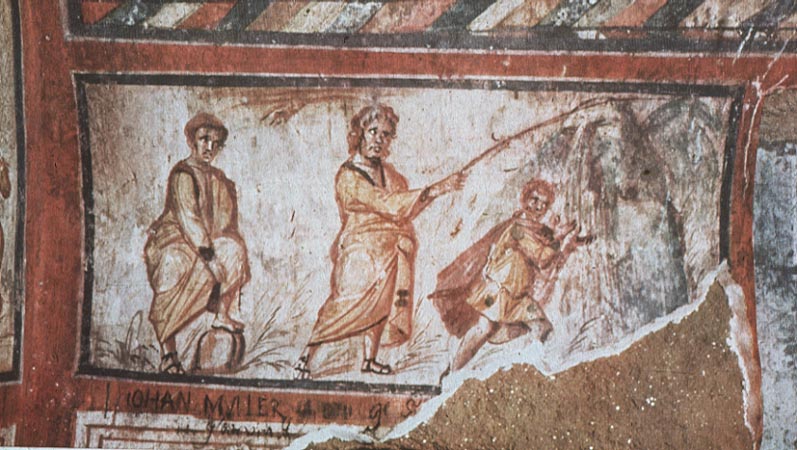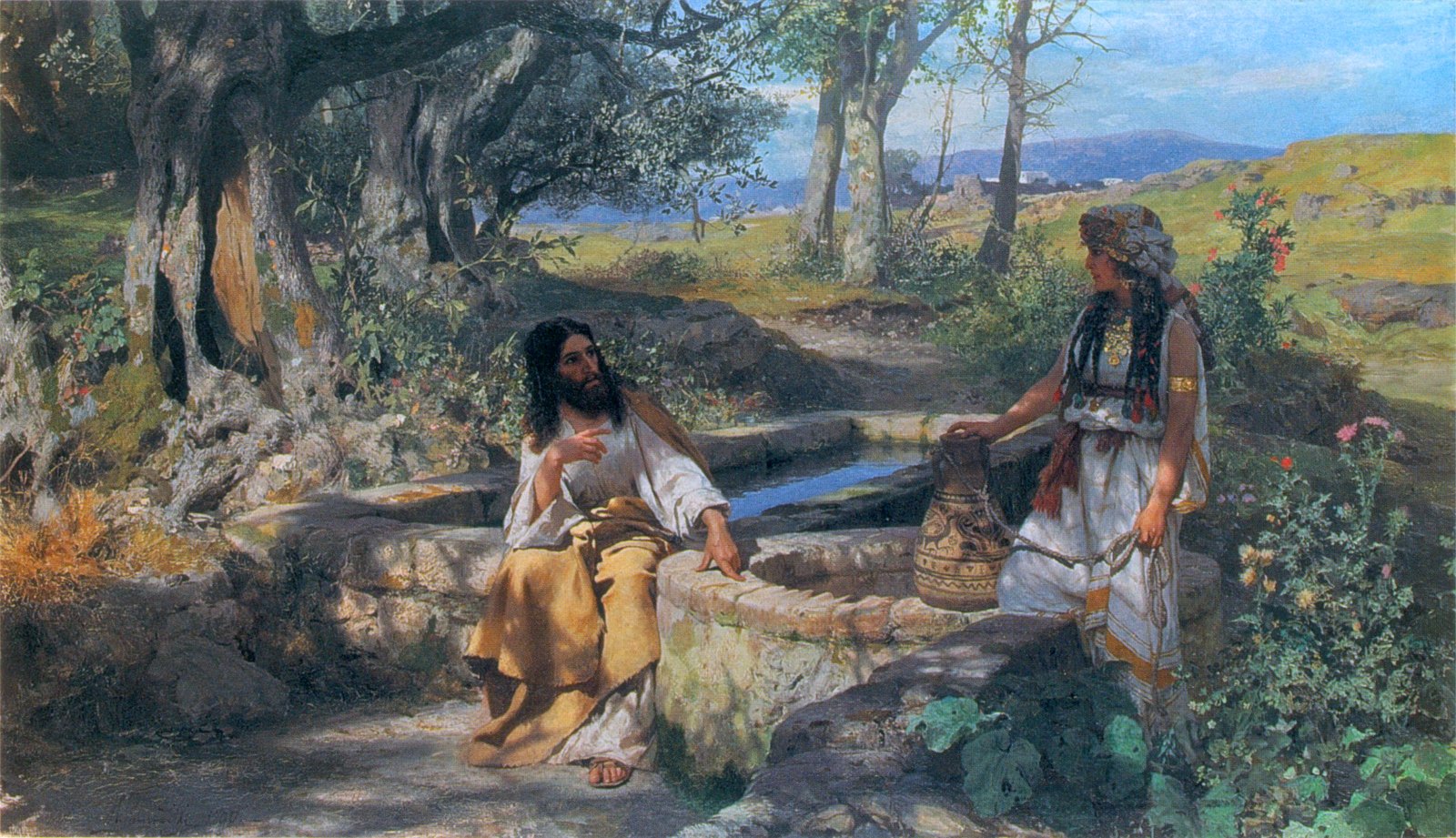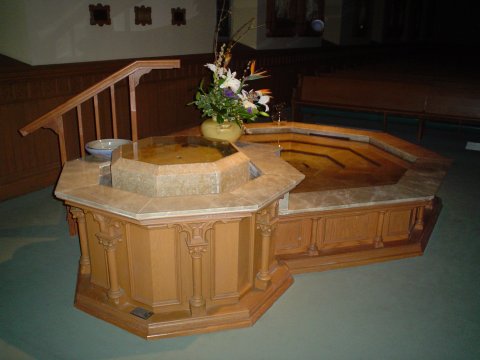Homily of Fr. Paul Panaretos, S.J.
Thirsty Faith
I direct my reflection to our Elect, and invite everyone to listen. Why? Lent prepares people to be baptized and confirmed at Easter. As we pray for our Elect and offer them our friendship and example, we renew our own baptisms as well as the grace of our confirmations: to be conformed more to the image of our Messiah. One fruit of Lent is keener awareness that Jesus is among us and within us. Cultivating that fruit is not without challenges.
 The grumbling and quarreling of the Israelites focused on the Lord God. Their liberty from slavery in Egypt landed them in the wilderness for generations. When we are without moorings, whether because we are lost or without direction for ourselves or because of illness or the death of a dear one--when our bodies lack moorings, our innermost selves, our spirits ache. We can name our own experiences of wilderness both around us and within us.
The grumbling and quarreling of the Israelites focused on the Lord God. Their liberty from slavery in Egypt landed them in the wilderness for generations. When we are without moorings, whether because we are lost or without direction for ourselves or because of illness or the death of a dear one--when our bodies lack moorings, our innermost selves, our spirits ache. We can name our own experiences of wilderness both around us and within us.The Israelites and their human thirst tested their faith. Better, their human thirst led them to question, “Is the Lord in our midst or not?” Water they received--they did not find water. God provided water from an unlikely source to help them journey in unforgiving territory. God-given waters of grace are often unexpected.
Territory that is interior is the main theatre of action for us humans. The Fourth Gospel used spirit for one’s interior and more real landscape--Everything is mediated to us by our senses. As we heard, human thirst led the Israelites to quarrel and to test the Lord. Human thirst may even cause fatigue and a restlessness of spirit.
 At Jacob’s well near the Samaritan village of Sychar, God thirsted in Jesus’ humanity. Fatigued he sat down. In the course of conversing with a woman, who came to her ancestor’s well, her physical thirst and her thirst for relief from drawing water, became her thirst for the Most Real. Her more real thirst was belief: the woman came to believe in Jesus: “Sir, I can see you are a prophet...the Messiah.”
At Jacob’s well near the Samaritan village of Sychar, God thirsted in Jesus’ humanity. Fatigued he sat down. In the course of conversing with a woman, who came to her ancestor’s well, her physical thirst and her thirst for relief from drawing water, became her thirst for the Most Real. Her more real thirst was belief: the woman came to believe in Jesus: “Sir, I can see you are a prophet...the Messiah.”Their exchanges in their conversation moved from H20 to living water, namely God’s life. The woman gradually grasped that Jesus spoke of something greater than well-water. Jesus invited her belief, and she became an apostle: She left her water jar and went into the town and said to the people, “Come see a man who told me everything I have done. Could he possibly be the Messiah?”
My friends, who are Elect for the Easter sacraments, this scene, and others in the Fourth Gospel, reminds us that far from denigrating our humanity God in Jesus by their Spirit divinizes us. To use Catholic vocabulary long used to describe the workings of the sacramental channels of God’s life: Water is the matter, that is, what our senses grasp. Living water, God’s life, is the form, that is, the more real and more substantial gift, which slakes our more real and more substantial thirst.
The sacraments affect us, and we are to live their effects on us day to day. In your own ways each of you has known a more real and more substantial thirst than parched throats. I hope a Catholic adult or child helped you turn toward us. I hope the Gesu Parish community continues to invite your belief in the Source of living water in which three of you, not yet baptized, will enter at Easter. The baptisms of all of you will be sealed by Jesus’ Spirit so that you may live the effects God’s life exerts on you to be more like Jesus.
 As an Italian priest of the Diocese of Rome said last week in an exchange with Pope Benedict: “...it is true...that whoever sees the Son has seen the Father, so whoever sees us, his Church, can see Christ.”/1/ God pours God’s life into us and we become channels to God for others. I am heartened that you, our Elect, will join us to be formed by Jesus’ Holy Spirit to form others!
As an Italian priest of the Diocese of Rome said last week in an exchange with Pope Benedict: “...it is true...that whoever sees the Son has seen the Father, so whoever sees us, his Church, can see Christ.”/1/ God pours God’s life into us and we become channels to God for others. I am heartened that you, our Elect, will join us to be formed by Jesus’ Holy Spirit to form others!In your daily 15 minutes with Jesus this week, consider with open hearts the life which God overflows into your hearts. Ask the Samaritan woman to introduce you to Jesus so that you may converse with Jesus and hear him invite your loving belief in him. Tell Jesus your thirst--however insignificant it may seem. After being vulnerable with Jesus, close your time by saying slowly the Lord’s Prayer. Its request for “daily bread” is satisfied by the eucharist, which satisfies the hunger and thirst our spirits know so well, and which Jesus seeks to quench in person.
____________
/1/ Read the question to the pope his reply.
_________________________________________________________
Wiki-images of Moses striking the rock and Jesus and woman at Jacob's well are in the public domain. Wiki-image of a baptismal pool is used according to the GFDL.
No comments:
Post a Comment